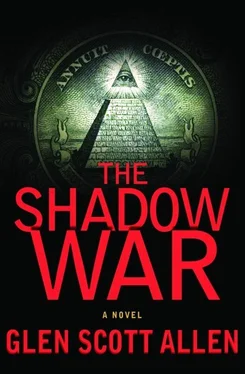Glen Allen - The shadow war
Здесь есть возможность читать онлайн «Glen Allen - The shadow war» весь текст электронной книги совершенно бесплатно (целиком полную версию без сокращений). В некоторых случаях можно слушать аудио, скачать через торрент в формате fb2 и присутствует краткое содержание. Жанр: Триллер, на английском языке. Описание произведения, (предисловие) а так же отзывы посетителей доступны на портале библиотеки ЛибКат.
- Название:The shadow war
- Автор:
- Жанр:
- Год:неизвестен
- ISBN:нет данных
- Рейтинг книги:5 / 5. Голосов: 1
-
Избранное:Добавить в избранное
- Отзывы:
-
Ваша оценка:
- 100
- 1
- 2
- 3
- 4
- 5
The shadow war: краткое содержание, описание и аннотация
Предлагаем к чтению аннотацию, описание, краткое содержание или предисловие (зависит от того, что написал сам автор книги «The shadow war»). Если вы не нашли необходимую информацию о книге — напишите в комментариях, мы постараемся отыскать её.
The shadow war — читать онлайн бесплатно полную книгу (весь текст) целиком
Ниже представлен текст книги, разбитый по страницам. Система сохранения места последней прочитанной страницы, позволяет с удобством читать онлайн бесплатно книгу «The shadow war», без необходимости каждый раз заново искать на чём Вы остановились. Поставьте закладку, и сможете в любой момент перейти на страницу, на которой закончили чтение.
Интервал:
Закладка:
One day back then, when she was perhaps seven, she began speaking in a language all her own, and her mother asked, "What is that? Have you lost your mind?" And she'd answered, "Don't you know? This is English."
She simply hadn't fit in Uzhur, not in any sense. In a town where tanks sat at the entrances like squat, metal dragons; where soldiers were more common than children; where the boundaries were marked not by the usual fields of wheat and barley, but by a huge fence topped with electrified barbed wire; a town that, had she looked on a map, she wouldn't have found listed… in the midst of all this regimentation and sense of constantly being scrutinized, she was an utterly foreign free spirit.
She remembered one day her father came home from a ten-day duty at his base-what he called his "time in the hole"-to find her doodling on a photo of Lenin. It was an old black-and-white picture in one of the Party-published biographies her father kept above the desk he called his study, and she'd drawn a clown nose, gogglelike glasses, and a full beard on the Father of the Soviet Union's sacred face.
Her father had reacted in horror.
"Do you want a chance to become an orphan?" he'd said, snatching the book away.
Later, she saw him feeding it into the fire he started in their tiny, rarely used fireplace. But she also saw that he was smiling.
And so she'd learned something all the other children seemed to know instinctively: there were things you didn't draw, didn't say, didn't do.
Thinking now of that time reminded her of the tremendous pride she'd always felt in her father, even when he punished her for her independent ways. She remembered the ritual of him polishing his high, shiny black boots, the spitting and rubbing that would continue for an hour. "Can you see yourself, Natashka?" he would say, holding the boot beneath her face. She remembered the strong, musky smell of boot polish and leather, the way the boots made Nikolai seem a foot taller when he finally pulled them on. And then he would disappear for ten days or two weeks at a time. When he returned he was always very hungry, very happy, and very tired.
She snapped awake. She looked to the clock: 12:45. She cursed. Her father might already be gone for his morning's puttering at his garden.
She went to the end of the living room where she had her desk, a small study area that, she realized now, was a copy of her father's back in the apartment in Uzhur. She picked up the handset and dialed the prefix for Russia, and then the area code for Dubna.
She listened to the metallic buzz of the first ring. And then the second. Then she heard her father's voice.
"Alloa?" he said.
"Nikolai," she replied. She had addressed him with his first name since leaving the university, feeling it was the truly adult thing to do. " Privet. This is your daughter."
"Natashka." She could hear the pleasure in his voice. " Privet. You caught me just as I was leaving. I have to put my time in as a peasant, you know."
She laughed. "I won't keep you long, Father. I just wanted to know how you are."
"Ah," he said. She could hear the reticence in his voice. "I survive. That's the most important thing."
"You are well?" she asked.
"Better than some," he replied. Then he went on to list the troubles of various relatives and friends: divorces, drunkenness, unruly children, poor wages. It was all something of a ritual with them. "And poor Dmitri Sergeivich. His leukemia is very stubborn."
Dmitri was one of her father's oldest comrades from his days as a rocketchiki. Natalya knew that the incidence of all sorts of cancer and blood diseases was extraordinarily high among the former rocketchiki; her father attributed it to "sitting like a hen on nuclear eggs" for years at a time. Fortunately, her father was as yet free of such "souvenirs of service," as the ex-soldiers called them.
"And you, Natashka? How is my little diplomat?"
"I am fine, Father. I had lunch with the president just yesterday," she joked. "He agreed to see about increasing your pension."
She knew her father's so-called military pension was a ridiculously small amount, given his years of dedicated service. He worked now with a branch of the State Bank in Dubna, looking after their security and planning for various emergencies and disasters. He described the difference in responsibilities this way: "Once I held the fate of the planet at the tip of my finger. Now I use that finger to plug leaks."
She spoke for a few minutes about her work at the Cultural Center, trying to make it sound more glamorous than it really was, as she knew this made her father feel a sense of pride. She mentioned the Bolshoi reception, and he responded that she was living the life of an aristocrat.
"How things have changed," he said, somewhat wistfully.
She laughed again. "An aristocrat that works like a dog," she said. And, since she knew he was about to say he had to leave for his garden, she finally broached the subject she'd been working up to.
"Nikolai," she tried to keep the increased tension and formality out of her voice. "You know I am contacted from time to time by American professors, seeking help with books from the archives." She waited for a moment, but he didn't respond. "Well, I received a very curious request the other day, about such a book. But I cannot find anything about it in the places I usually look. I thought perhaps it was a book you might have encountered in… your extensive reading."
Now her father's silence was palpable. "Yes?" he said finally.
"It is a book with a strange name. Or actually, it might not be the book's name at all. The American was not certain about that. He knows only that it was published sometime between 1960 and 1970." She waited.
"And this book's maybe-name?" her father asked.
"Something like Stzenariy 55. Or perhaps it is Borba s tenyu. You see? Very confusing."
Again, there was silence.
"Have you ever heard of a book with either title?" she prodded.
"No," her father said finally.
She waited again, for some question, some comment. But he said nothing.
"Are you certain," she said, though she already knew his answer. "Nothing like that at all?"
"I've read so many books, Natalya," and she noticed his return to the formal address, "it's hard to remember them all. But a title like that… and who is this American academician who is asking about this maybe-book? A boyfriend?"
She laughed, even though she felt the joke was forced. "No, I've never met him." She was about to tell him Jeremy Fletcher's name, when for some reason she decided not to. "Just someone at an American university. Probably someone whose Russian is very bad, and he simply mixed it all up."
"Yes," her father said. "I'm certain that's it. Probably best just to leave it alone. You know how persistent these Americans can be." He paused for a moment. "Probably someone you should not contact."
Then they exchanged a rather awkward "pakah," too informal a farewell for the tension she suddenly felt; and then, instead of hanging up, her father had added, "Natalya, you know I love you very much."
She was surprised. He wasn't usually this emotionally forthcoming in their phone chats. "And I love you too, Father," she said.
And then they hung up.
Natalya sat for a while in the overstuffed chair, looking out the window, and wishing desperately for a cigarette. In all the years of her rebellions, her alien tastes and desires, her difficult marriage with Sander, her parents' separation and divorce… through all those years, she'd never suspected that her father actually ever lied to her.
But he was lying to her now. Of that she was certain.
It was nearly 1:30, far past her usual bedtime. Perhaps she would try to do something different on Sunday, something away from the center and the embassy, away from this search that was leading nowhere. Perhaps tomorrow she would go to the Mall, visit the Lincoln Memorial, and find some sort of wisdom there. Or at least comfort.
Читать дальшеИнтервал:
Закладка:
Похожие книги на «The shadow war»
Представляем Вашему вниманию похожие книги на «The shadow war» списком для выбора. Мы отобрали схожую по названию и смыслу литературу в надежде предоставить читателям больше вариантов отыскать новые, интересные, ещё непрочитанные произведения.
Обсуждение, отзывы о книге «The shadow war» и просто собственные мнения читателей. Оставьте ваши комментарии, напишите, что Вы думаете о произведении, его смысле или главных героях. Укажите что конкретно понравилось, а что нет, и почему Вы так считаете.












